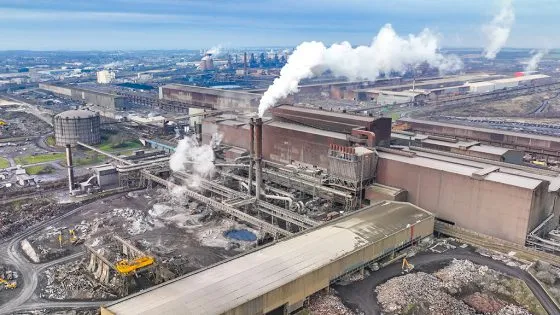The potential closure of steelmaking operations at British Steel’s Scunthorpe site has been branded as “heartbreaking” and “distressing” for workers and the wider construction industry.
British Steel announced yesterday (27 March) that it was starting a consultation on closing the two blast furnaces at its Scunthorpe site after experiencing production instability and significant financial losses of around £700,000 a day.
They are the only remaining blast furnaces in the UK, with Tata Steel’s Port Talbot facility shutting down last year ahead of the construction of an electric arc furnace replacement.
British Constructional Steelwork Association (BCSA) chief executive Jonathan Clemens said the move would have a major impact on the construction industry.
“This is clearly a distressing announcement not just to the workers and their families directly employed by British Steel, but the wider supply chain and specifically the construction industry where most of the production from the site is used,” he told Construction News.
“It is hoped that this consultation will quickly reach a positive outcome in terms of maintaining the capability of steel production in the UK and to allay the uncertainty for all involved.”
He said the BCSA will continue to work “diligently” with the steel supply chain to ensure its members continue to support UK and Irish construction projects and jobs.
Gareth Stace, director general of trade body UK Steel, described the announcement as “heartbreaking”.
“It is a shocking blow to the 3,400 workers, our sector and to the whole community in Scunthorpe. This gut punch to UK steelmaking will have a profound impact, felt throughout the British economy,” he said.
“All options should be on the table, and we need a secure future for our steel industry. The end of steelmaking at British Steel would mean we have a major gap in capacity to meet the future demand of the nation and will be an irreparable break in the armour of national security.
“This devastating decision will cause untold disruption and damage to our supply chains, threatening jobs, businesses and the nation’s economic strengths.”
He called on the government to negotiate over the future of the facility.
In a statement, British Steel said blast furnaces and steelmaking operations were no longer financially sustainable “due to highly challenging market conditions, the imposition of tariffs, and higher environmental costs relating to the production of high-carbon steel”.
The company, which was bought out of receivership by Chinese steelmaker Jingye in 2020, said it tried to gain UK Government support for investment in two new electric arc furnaces but “following many months of negotiations, no agreement has been reached”.
It could close its operations as soon as June, under one proposal in the consultation, though the company said it would “continue to work with the UK Government to explore options for the future of the business”.
Industry minister Sarah Jones told Parliament the government had made a “generous conditional offer” to the company earlier this week which depended on it meeting “accountability and legal requirements”, but it had not received a response.
“Our preferred approach by far is that British Steel comes back to the table, talks with us about the offer on the table and we have that private sector investment in the future, but of course we are looking at all options,” she said.
In 2019, Network Rail made a bid for British Steel’s rail manufacturing business when it was in receivership, in order to secure its supply of track.
Asked this week whether it was concerned about the latest announcement, the government-owned company said it had contingency plans in place.
“We are continuing to work with government and our suppliers, and we have comprehensive contingency plans in place to ensure the continued supply of rail needed to fulfil our operational needs,” a spokesperson said.
Last month, Heathrow Airport chief executive Thomas Woldbye announced the company would use UK steel in its third runway build, during a speech at British Steel’s Scunthorpe plant.
The Department for Business and Trade has estimated that the airport’s expansion would require 400,000 tonnes of steel.
Heathrow Airport has been approached for comment on British Steel’s announcement.

